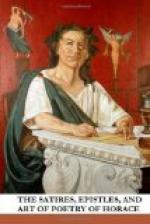Hallo there, youngster! take my book, you rogue,
And write this in, by way of epilogue.
BOOK II.
SATIRE I.
SUNT QUIBUS in SATIRA.
Horace. Trebatius.
HORACE.
Some think in satire I’m too keen, and press
The spirit of invective to excess:
Some call my verses nerveless: once begin,
A thousand such per day a man might spin.
Trebatius, pray advise me.
T. Wipe your pen.
H. What, never write a single line again?
T. That’s what I mean.
H. ’Twould suit me, I protest, Exactly: but at nights I get no rest.
T. First rub yourself three times with oil all o’er,
Then swim the Tiber through from shore to shore,
Taking good care, as night draws on, to steep
Your brain in liquor: then you’ll have
your sleep.
Or, if you still have such an itch to write,
Sing of some moving incident of fight;
Sing of great Caasar’s victories: a bard
Who works at that is sure to win reward.
H. Would that I could, my worthy sire! but skill
And vigour lack, how great soe’er the will.
Not every one can paint in epic strain
The lances bristling on the embattled plain,
Tell how the Gauls by broken javelins bleed,
Or sing the Parthian tumbling from his steed.
T. But you can draw him just and brave, you know,
As sage Lucilius did for Scipio.
H. Trust me for that: my devoir I will pay,
Whene’er occasion comes to point the way.
Save at fit times, no words of mine can find
A way through Cassar’s ear to Cassar’s
mind:
A mettled horse, if awkwardly you stroke,
Kicks out on all sides, and your leg is broke.
T. Better do this than gall with keen lampoon
Cassius the rake and Maenius the buffoon,
When each one, though with withers yet unwrung,
Fears for himself, and hates your bitter tongue.
H. What shall I do? Milonius, when the wine
Mounts to his head, and doubled lustres shine,
Falls dancing; horses are what Castor loves;
His twin yolk-fellow glories in the gloves:
Count all the folks in all the world, you’ll
find
A separate fancy for each separate mind.
To drill reluctant words into a line,
This was Lucilius’ hobby, and ’tis mine.
Good man, he was our better: yet he took
Such pride in nought as in his darling book:
That was his friend, to whom he would confide
The secret thoughts he hid from all beside,
And, whether Fortune used him well or ill,
Thither for sympathy he turned him still:
So there, as in a votive tablet penned,
You see the veteran’s life from end to end.
His footsteps now I follow as I may,
Lucanian or Apulian, who shall say?
For we Venusians live upon the line
Just where Lucania and Apulia join,
Planted,’tis said, there in the Samnites’
place,
To guard for Rome the intermediate space,
Lest these or those some day should make a raid
In time of war, and Roman soil invade.




